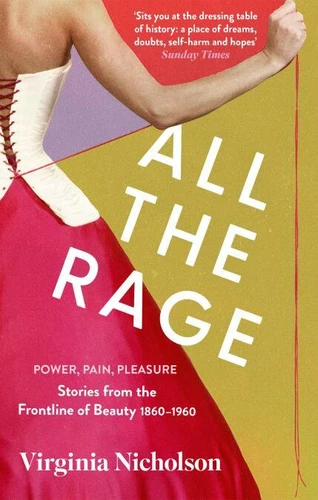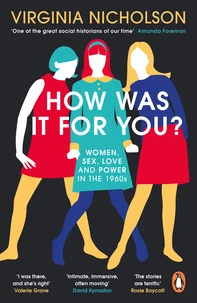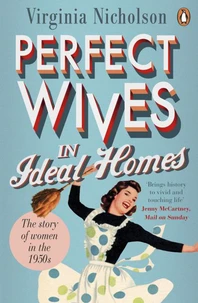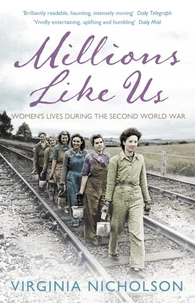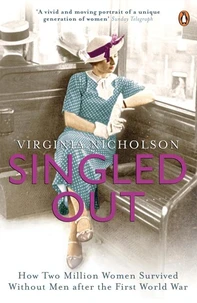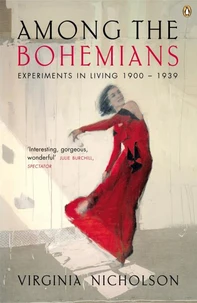All the Rage. Power, Pain, Pleasure: Stories from the Frontline of Beauty 1860 - 1960
Par :Formats :
Disponible dans votre compte client Decitre ou Furet du Nord dès validation de votre commande. Le format ePub protégé est :
- Compatible avec une lecture sur My Vivlio (smartphone, tablette, ordinateur)
- Compatible avec une lecture sur liseuses Vivlio
- Pour les liseuses autres que Vivlio, vous devez utiliser le logiciel Adobe Digital Edition. Non compatible avec la lecture sur les liseuses Kindle, Remarkable et Sony
- Non compatible avec un achat hors France métropolitaine
 , qui est-ce ?
, qui est-ce ?Notre partenaire de plateforme de lecture numérique où vous retrouverez l'ensemble de vos ebooks gratuitement
Pour en savoir plus sur nos ebooks, consultez notre aide en ligne ici
- Nombre de pages528
- FormatePub
- ISBN978-0-349-01430-2
- EAN9780349014302
- Date de parution07/02/2024
- Protection num.Adobe DRM
- Infos supplémentairesepub
- ÉditeurVirago
Résumé
'Sits you at the dressing table of history: a place of dreams, doubts, self-harm and hopes' -Sunday TimesAt the heart of this history is the female body. The century-span between the crinoline and the bikini witnessed more mutations in the ideal western woman's body shape than at any other period. In this richly detailed account, Virginia Nicholson, described as 'one of the great social historians of our time...' (Amanda Foreman) and a truly brilliant researcher has produced a most remarkable social history revealing the power, the pain and the pleasure involved in adorning the female body.
She asks how custom, colour, class and sex fit into the picture, and shrewdly charts how the advances made by feminism collided with the changing shape of desirability. Full of surprising facts - the feminist plastic surgeon, the radioactive corset - alongside stories of the 'New Women' who discovered freedom by bobbing their hair, those who were the early adopters of trousers, and early Black beauty entrepreneurs, this book chronicles the codes, the contradictions, the lies and the highs of beauty.
Virginia Nicholson shows how the pursuit of beauty can be oppressive but also a way of negotiating the world and that adornment can be a deep pleasure. It's complicated!`This is a fascinating book: funny, unexpected, forgiving, political, personal, glamorous and yes, quietly, angry. Read it for the amazing stories; stay for the self-knowledge. Or the Revolution' -Louisa Young, Prospect
She asks how custom, colour, class and sex fit into the picture, and shrewdly charts how the advances made by feminism collided with the changing shape of desirability. Full of surprising facts - the feminist plastic surgeon, the radioactive corset - alongside stories of the 'New Women' who discovered freedom by bobbing their hair, those who were the early adopters of trousers, and early Black beauty entrepreneurs, this book chronicles the codes, the contradictions, the lies and the highs of beauty.
Virginia Nicholson shows how the pursuit of beauty can be oppressive but also a way of negotiating the world and that adornment can be a deep pleasure. It's complicated!`This is a fascinating book: funny, unexpected, forgiving, political, personal, glamorous and yes, quietly, angry. Read it for the amazing stories; stay for the self-knowledge. Or the Revolution' -Louisa Young, Prospect
'Sits you at the dressing table of history: a place of dreams, doubts, self-harm and hopes' -Sunday TimesAt the heart of this history is the female body. The century-span between the crinoline and the bikini witnessed more mutations in the ideal western woman's body shape than at any other period. In this richly detailed account, Virginia Nicholson, described as 'one of the great social historians of our time...' (Amanda Foreman) and a truly brilliant researcher has produced a most remarkable social history revealing the power, the pain and the pleasure involved in adorning the female body.
She asks how custom, colour, class and sex fit into the picture, and shrewdly charts how the advances made by feminism collided with the changing shape of desirability. Full of surprising facts - the feminist plastic surgeon, the radioactive corset - alongside stories of the 'New Women' who discovered freedom by bobbing their hair, those who were the early adopters of trousers, and early Black beauty entrepreneurs, this book chronicles the codes, the contradictions, the lies and the highs of beauty.
Virginia Nicholson shows how the pursuit of beauty can be oppressive but also a way of negotiating the world and that adornment can be a deep pleasure. It's complicated!`This is a fascinating book: funny, unexpected, forgiving, political, personal, glamorous and yes, quietly, angry. Read it for the amazing stories; stay for the self-knowledge. Or the Revolution' -Louisa Young, Prospect
She asks how custom, colour, class and sex fit into the picture, and shrewdly charts how the advances made by feminism collided with the changing shape of desirability. Full of surprising facts - the feminist plastic surgeon, the radioactive corset - alongside stories of the 'New Women' who discovered freedom by bobbing their hair, those who were the early adopters of trousers, and early Black beauty entrepreneurs, this book chronicles the codes, the contradictions, the lies and the highs of beauty.
Virginia Nicholson shows how the pursuit of beauty can be oppressive but also a way of negotiating the world and that adornment can be a deep pleasure. It's complicated!`This is a fascinating book: funny, unexpected, forgiving, political, personal, glamorous and yes, quietly, angry. Read it for the amazing stories; stay for the self-knowledge. Or the Revolution' -Louisa Young, Prospect

